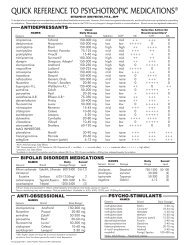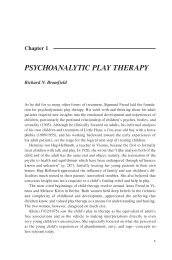IRAQ WAR CLINICIAN GUIDE
Iraq War Clinician's Guide - Network Of Care
Iraq War Clinician's Guide - Network Of Care
You also want an ePaper? Increase the reach of your titles
YUMPU automatically turns print PDFs into web optimized ePapers that Google loves.
Iraq War Clinician Guide 193 Appendix I<br />
DEPRESSION<br />
A NATIONAL CENTER FOR PTSD FACTSHEET<br />
Jennifer Cregg, Ph.D<br />
Depression is a common problem in which severe and long lasting feelings of sadness or other<br />
problems get in the way of a person's ability to function. In any given year, as many as 18.8<br />
million American adults-9.5% of the adult population+xperience some type of depression.<br />
Unlike a blue mood that comes and goes, depression is a persistent problem that affects the way a<br />
person eats and sleeps, thinks about things, and feels about him- or herself.<br />
What are the Symptoms of Depression?<br />
The symptoms of depression can vary quite a bit, but most people who experience depression feel<br />
down or sad more days than not, or find that things in their life no longer seem enjoyable or<br />
interesting. Additionally, people with depression may notice changes in their sleeping, eating,<br />
concentration, or feelings about themselves, and may find themselves feeling hopeless. These<br />
symptoms typically last for at least 2 weeks without letting up.<br />
What Causes Depression?<br />
Depression has many causes. Difficulty coping with painful experiences or losses contributes to<br />
depression. People returning from a war zone often experience painful memories, feelings of guilt,<br />
or regret about their war experiences, or have a tough time readjusting back to normal life.<br />
Trouble coping with these feelings and experiences can lead to depression. Some types of<br />
depression run in families, and depression is often associated with chemical imbalances and other<br />
changes in the brain.<br />
How is Depression Treated?<br />
There are many treatment options for depression. An evaluation should be done by a healthcare<br />
professional to help determine which type of treatment is best for an individual. Typically, milder<br />
forms of depression are treated by psychotherapy, and more severe depression is treated with<br />
medications or a combination of psychotherapy and medication. Your doctor can help you<br />
determine which treatment is best for you.<br />
Psychotherapy. There are a number of types of psychotherapy (or talk therapy) that are used to<br />
treat depression. These treatments may involve just a few sessions, or may last 10-20 weeks or<br />
longer. Psychotherapy treatments tend to focus on helping patients learn about their problems and<br />
resolve them, through working with a therapist and learning new patterns of behavior to help<br />
decrease depression. Two of the main types of psychotherapy for depression are interpersonal<br />
therapy and cognitive-behavioral therapy. Interpersonal therapy focuses on the patient's<br />
relationships with other people, and how these relationships may cause and maintain depression.<br />
Cognitive-behavioral treatments help patients change negative styles of thinking and acting that<br />
can lead to depression.<br />
DEPARTMENT OF VETERANS AFFAIRS<br />
-.-.-<br />
NATIONAL CENTER FOR PTSD




